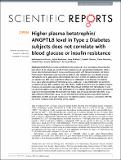| dc.contributor.author | Abu-Farha, Mohamed | en_US |
| dc.contributor.author | Abubaker, Jehad | en_US |
| dc.contributor.author | Al-Khairi, Irina | en_US |
| dc.contributor.author | Cherian, Preethi | en_US |
| dc.contributor.author | Noronha, Fiona | en_US |
| dc.contributor.author | Hu, Frank B. | en_US |
| dc.contributor.author | Behbehani, Kazem | en_US |
| dc.contributor.author | Elkum, Naser | en_US |
| dc.date.accessioned | 2015-12-04T18:15:39Z | |
| dc.date.issued | 2015 | en_US |
| dc.identifier.citation | Abu-Farha, Mohamed, Jehad Abubaker, Irina Al-Khairi, Preethi Cherian, Fiona Noronha, Frank B. Hu, Kazem Behbehani, and Naser Elkum. 2015. “Higher plasma betatrophin/ANGPTL8 level in Type 2 Diabetes subjects does not correlate with blood glucose or insulin resistance.” Scientific Reports 5 (1): 10949. doi:10.1038/srep10949. http://dx.doi.org/10.1038/srep10949. | en |
| dc.identifier.issn | 2045-2322 | en |
| dc.identifier.uri | http://nrs.harvard.edu/urn-3:HUL.InstRepos:23845355 | |
| dc.description.abstract | Betatrophin/ANGPTL8 is a newly identified hormone produced in liver and adipose tissue that has been shown to be induced as a result of insulin resistance and regulates lipid metabolism. Little is known about betatrophin level in humans and its association with T2D and metabolic risk factors. Plasma level of betatrophin was measured by ELISA in 1603 subjects: 1047 non-diabetic and 556 T2D subjects and its associations with metabolic risk factors in both non-diabetic and T2D were also studied. Our data show a significant difference in betatrophin levels between non-diabetic (731.3 (59.5–10625.0) pg/ml) and T2D (1710.5 (197.4–12361.1) p < 0.001. Betatrophin was positively correlated with age, BMI, waist/hip ratio, FBG, HbA1C, HOMA-IR and TG in the non-diabetic subjects. However, no association was observed with BMI, FBG, HbA1C or HOMA-IR in T2D subjects. TC and LDL showed negative association with betatrophin in T2D subjects. Multivariate analysis showed that subjects in the highest tertile of betatrophin had higher odds of having T2D (odd ratio [OR] = 6.15, 95% confidence interval [CI] = (3.15 – 12.01). Our data show strong positive associations between betatrophin and FBG and insulin resistance in non-diabetic subjects. However, correlations with FBG and insulin resistance were diminished in T2D subjects. | en |
| dc.language.iso | en_US | en |
| dc.publisher | Nature Publishing Group | en |
| dc.relation.isversionof | doi:10.1038/srep10949 | en |
| dc.relation.hasversion | http://www.ncbi.nlm.nih.gov/pmc/articles/PMC4650613/pdf/ | en |
| dash.license | LAA | en_US |
| dc.title | Higher plasma betatrophin/ANGPTL8 level in Type 2 Diabetes subjects does not correlate with blood glucose or insulin resistance | en |
| dc.type | Journal Article | en_US |
| dc.description.version | Version of Record | en |
| dc.relation.journal | Scientific Reports | en |
| dash.depositing.author | Hu, Frank B. | en_US |
| dc.date.available | 2015-12-04T18:15:39Z | |
| dc.identifier.doi | 10.1038/srep10949 | * |
| dash.contributor.affiliated | Hu, Frank | |


